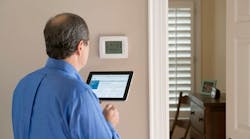Duke Energy Proposes Energy Efficiency Enhancements in South Carolina
Duke Energy’s utilities in South Carolina are proposing new and enhanced energy efficiency programs to help customers save energy and money, expanding on the companies’ experience in implementing programs that to date have saved more than 3.5 billion kilowatt hours (kWh) of electricity and $6.5 billion for customers in the Carolinas.
The proposals from Duke Energy Carolinas (DEC) and Duke Energy Progress (DEP) – if approved by the Public Service Commission of South Carolina – will continue to shrink the challenge of serving the region’s fast-growing electricity needs by delivering cost-effective energy savings.
“Our customers have been clear in telling us they want options that give them more control over their energy usage and provide help for those who might struggle to make their homes more efficient,” said Mike Callahan, Duke Energy’s South Carolina state president. “We believe these programs can make a big difference to the quality of life of many customers across the state.”
Two new pilot programs focus on innovative ways to address the needs of the most vulnerable customers by making their homes safer and more energy efficient. They include:
High-Energy Use Pilot (DEP) – Through this program, the company will partner with nonprofit agencies to supply energy improvements and home repairs where needed, targeting low-income homes that have much higher-than-average electricity use. The program will launch initially working alongside the City of Sumter and Sumter County through Sumter United Ministries, a community organization with a long history of working to improve the housing stock of its vulnerable citizens in the county. This initiative will allow customers in Sumter to get a complete home overhaul, leaving them with more efficient, safer homes and lower electric bills. Additional DEP communities are encouraged to participate in the program as well.
Tariffed On-Bill Pilot (DEP) – This program will enable customers to make investments in energy efficiency upgrades that will be repaid as part of the monthly electric bill associated with the premises through a monthly charge.
Proposals before the PSCSC would also modify two existing programs that have been helping customers save energy and money for many years. They are:
Weatherization Program Modifications (DEC) – An income-qualified program that operates in partnership with community action agencies, the proposed modifications would expand the class of eligible customers and align the program across both utilities by adjusting incentives and reflecting current federal standards.
Home Energy House Call Program Enhancements (DEC and DEP) – This program provides in-home energy audits to single family homeowners. The enhancement will allow renters, multifamily residents and residents of manufactured homes to participate with a virtual option.
Duke Energy Carolinas/Duke Energy Progress


